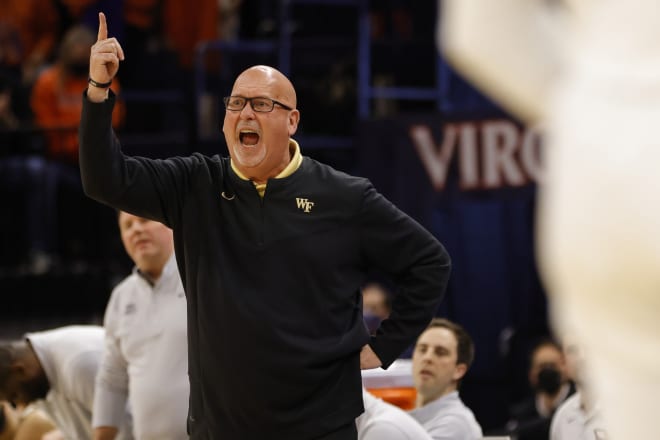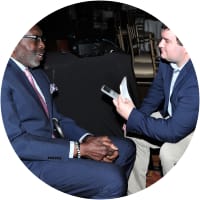State of the Program, Part I: Wake Forest moves forward
Moving forward means taking one last look at last season and applying lessons learned to the future

Editor’s note: This is the first of five stories in a series of stories about Wake Forest’s men’s basketball program. Quotes from coach Steve Forbes come from both a summer press conference and a one-on-one meeting conducted last week.
WINSTON-SALEM – To some degree, Wake Forest and coach Steve Forbes moved past the sting of being left out of the NCAA tournament last season within 24 hours of the selection show’s airing.
By this time of year, with departing players moving out months ago and newcomers on campus for workouts, the 2021-22 season is history for Wake’s men’s basketball program.
And yet, you couldn’t help but feel like it was a proverbial and final tearing off of a Band-Aid when Forbes last week talked about which losses hurt the Deacons the most.
“Sadly, a win over Miami (in the ACC tournament) would not have gotten us in the tournament. We would’ve had to beat Duke,” Forbes said. “Which means if we had beaten BC and Miami and lost to Duke in the ACC semifinals, we’d have had a 15-win ACC season and been left out of the tournament.
“I firmly believe that and I have the inside information to prove it.”
There is no better teacher than history.
For Wake Forest’s men’s basketball program to move forward, it must first evaluate and learn – the summer equivalent of survive and advance, if you will – from what worked and what didn’t last season.
A program dormant for most of 11 years is suddenly ready to move forward thanks to a revitalization led by Alondes Williams and Jake LaRavia, both of whom are off to the NBA.
As Forbes points out, though: Nobody at this time a year ago had Williams as the ACC player of the year or LaRavia as the 19th overall pick.
And nobody at this time last year thought the ACC would struggle to get five teams into the NCAA tournament.
“I knew the last time Wake went to the tournament, they were 9-9,” Forbes said. “So mentally I was thinking, ‘If we go 10-10, we’re going to get in.’
“I never, in my wildest dreams, would’ve thought we’d win 13 and not get in.”
The non-conference schedule is the controllable part of the equation here and it’s all but finalized at this point. Wake’s lack of Quad-1 wins was an anchor on its NCAA tournament chances last year.
Picking up more Quad-1 games isn’t simple in the era of the transfer portal and first-time transfer/immediate eligibility – as explained here.
The only time in the last 11 seasons that Wake Forest was in the NCAA tournament, 19 wins overall and a nine-win league slate (when the schedule was 18 games) were enough for a bid to the First Four.
When 23 total wins and a 13-7 ACC record and doesn’t punch a ticket, it doesn’t just sting for Wake Forest.
“There was a major uproar of our coaches,” Forbes said when the subject came up at ACC meetings last month. “Not me, I didn’t really have to say anything. It was everybody else because they don’t want to be in my shoes.”
It was spelled out to ACC coaches that a Duke win over Virginia Tech in the ACC championship would’ve resulted in Notre Dame – the team that was 15-5 and finished second in the ACC – being left out of the NCAA tournament.
Instead, the Irish won a game in the First Four and then scored an upset sixth-seeded Alabama, part of the ACC’s 14-5 record in the tournament.
“That didn’t go over very well. Notre Dame was the last team in the tournament,” Forbes said, again taking you inside the coaches’ meeting. “That’s very troubling. It’s not about quantity of wins, it’s about quality of wins, obviously.”
In light of that, Wake Forest has done what can be done to enhance the likelihood that it winds up with more Quad-1 wins. Home-and-home series with Rutgers and Georgia begin this season, and the Deacons will have a game against LSU in Atlanta.
It’s worth pointing out that last season’s schedule was designed the way it was for a couple of specific reasons.
One, because in this staff’s first season no more than 150 fans were allowed at Joel Coliseum because of COVID-19 (until the final home game). And two, because last season’s team had nine newcomers who needed time to mesh and gel on the court.
Last season’s schedule served its purpose; Fan interest progressed to the point of some true home-court advantages late in the season, and the team’s chemistry and confidence surged early in the season.
Come mid-March or so, we’ll know if the upcoming season’s schedule served its purpose, too.
